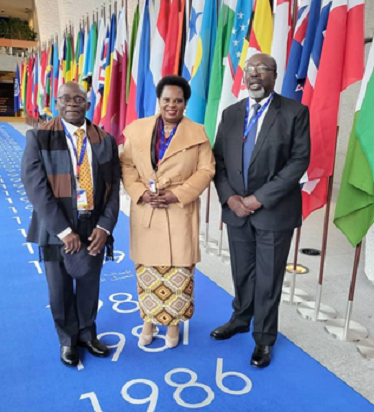African countries have endorsed the International Labour Organization’s proposed strategy on skills and lifelong learning and its plan of action for the period 2022–30.
Speaking in her position as the spokesperson on Social Dialogue for the Africa Group, the Minister for Gender, Labour and Social Development, Hon. Amongi Betty Ongom, noted that skills and lifelong learning are critical for youth employability and the promotion of national development.
“We welcome the principle upon which the strategy is anchored, emphasizing the participation of all stakeholders, development of resilient systems, social dialogue, promotion of human development, productive employment, and decent work for all.” Amongi said.
She delivered the statement at the ILO Governing Body’s 346th Session in Geneva, Switzerland on Thursday 10th November 2022.
The Minister observed that the Africa Group was also in concurrence with the five strategic pillars identified to implement the strategy because they recognize that skills are vital for enabling individuals and countries to thrive in an increasingly complex, interconnected, and rapidly changing world while recognizing the vital role new technologies and trends play in shaping policies on skills development for promoting growth that is inclusive and sustainable.
“The strategy recognizes the importance of the enhancement of productivity and sustainability of Micro, Small and Medium Enterprises and the informal economy as vital and emphasizes the need for Countries to design, develop and deliver policies that tackle skills development holistically.” She added.
The Africa group further welcomed the focus of the strategy on allocating increased funding to research and development, human capital, higher productivity, innovation, and a modernised social model that combats the effects of social exclusion.
The commitment by the ILO to lead a structured resource mobilization strategy to support countries to develop national implementation action plans was commended as crucial for developing countries.
However, with high levels of unemployment among the youth globally, Amongi called for financing towards research to identify skills that can support youth to transition from school to work and generate concrete data to enable governments understand why the challenges persist and gather national and regional best practices in tackling identified obstacles.
To ensure a balance between skills and job opportunities, the Africa Group pointed out that efforts to promote skilling should be complemented by employment-generating interventions.
“Although skilling is very important, it only addresses the supply-side challenge of making the labour force employable. We therefore call upon (ILO) to support constituents build capacity to develop job growth strategies.” Amongi observed.
Amongi led a Ugandan delegation that also included the Minister of State for Labour, Employment and Industrial Relations, Col. Okello Charles Engola Macodwogo.





